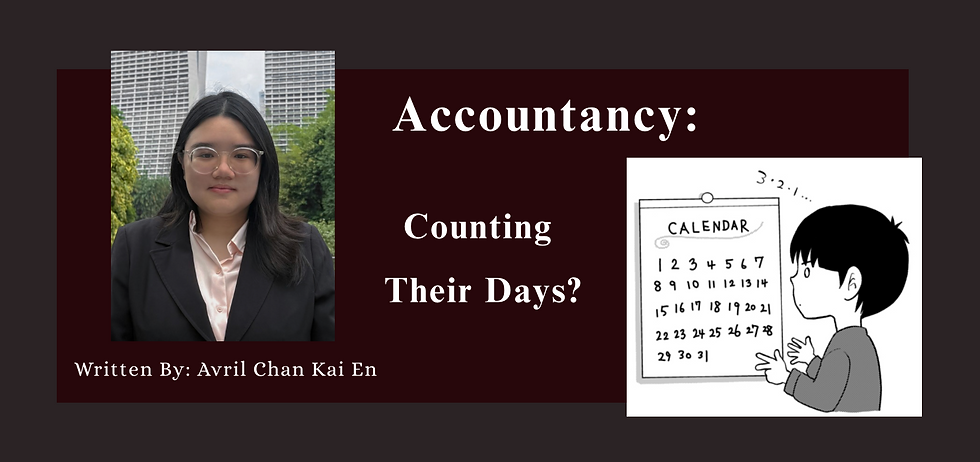Accountancy: Counting Their Days?
- SIMAA
- Jul 30, 2025
- 5 min read

When the youth of today are asked about their dream profession, you would be hard-pressed to find anyone who would declare it as being an accountant. The misconception that accountants are trapped in endless hours behind a desk crunching numbers is one that the industry may find hard to shake. This may reflect the low number of accountancy graduates at present.
Pipeline of accountants drying up despite strong demand
Over the past few years, the number of accounting degree students at universities in Singapore has fallen by more than 10 per cent. (The Straits Times, Evan Law) The trend continues internationally; In the USA, Accounting graduates trended downward in the 2019–2020 academic year, with decreases of 2.8% and 8.4% at the bachelor’s and master’s levels, respectively. Similarly, there has been a decrease in the number of people taking accounting programmes such as CPA, with the number of people taking CPA exams hitting a new low since 2006. (The CPA Journal). With a worrying deficit of fresh talent, and the remaining few accountants struggling with long and arduous working hours, leading to burnout and professionals leaving the industry, one could say that accountancy could become a dying profession.
Despite this, the demand for accountants remains as strong as ever. Companies worldwide are affected by the decreasing number of accountants. Big Companies like Planet Fitness, Mister Car Wash and Rivian Automotive all made errors in their accounts and subsequently had to correct their quarterly earnings statements in 2023, a detrimental mistake that could result in fines and shaken the confidence of investors. (The Straits Times) Smaller companies in need of accounting staff often decide not to fill the jobs because they either can’t afford to or can’t justify the cost-benefit trade-off. (The Wall Street Journal, Mark Maurer). In Singapore, an estimate in 2022 projected that by 2025, demand for new accounting jobs would reach about 6,000 to 7,000.(The Straits Times, Colin Tan)
With such high demand, what could possibly be stopping the youth of today from pursuing accountancy? While the stereotypes perpetuated of accountants do play a part, there seems to be other reasons that could deter the youth that the industry is doing its best to address in recent years.
Low wages
In a graduate employment survey in 2023, the median gross monthly salary for accountant graduates in Singapore was $3,800, lower compared to the median of all graduates from local universities. Accounting graduates who start specifically in accounting jobs earn even lower at $3,600 (The Straits Times, Rosalind Ang), lowerthan other sectors despite revisions in recent years. The Accounting Workforce Review Committee (AWRC), a task force headed by the Ministry of Finance and Authorities in Singapore, made suggestions for companies to review their compensation structures to increase wages at the beginning of their accounting career.
In response, many major accounting firms have increased their pay. For example, Deloitte will increase the starting pay by up to 20 per cent for graduates joining as first-year audit associates. Additionally, first-year hires joining Deloitte under its accelerated audit career programme from Sept 1 will have a starting salary of $4,500 a month. The pay for other first-year hires joining the firm as auditors will be $4,100. Another Big 4 firm, KPMG, is committing $30 million to raise salaries for eligible employees across its audit, tax and enterprise risk services from October 2024. (The Straits Times, Rosalind Ang)

High commitment
In Singapore, to become a recognised chartered accountant, one must obtain the Singapore Chartered Accountant Qualification (SCAQ). However, the process is rather lengthy and has many academic and practical requirements, one of which is the requirement to work for a minimum of 3 years and 450 working days in an Accrediting Training Organisation ATO) (ISCA). The high barriers to entry may have deterred many young professionals from joining the accounting sector.
Fortunately, ACRA and ISCA have been making adjustments to make the SCAQ more accessible, such as providing greater recognition for up to 18 months of previous work experience, as opposed to 12 months initially. (The Straits Times, Evan Law) Additionally, ISCA has recently established a partnership with SIM to provide more support for accountancy graduates aiming for the SCAQ (DigitalCFO Asia), including:
exemptions out of required examinations
the eligibility to undertake the foundation examinations in their final year
facilitating career placements with ATOs.

Fears of a changing industry
In an era with unprecedented and rampant advancements in technology, students may decide to steer away from degrees in accounting and prefer degrees in technology or finance. Research shows that the number of accountancy graduates grew far slower as software investment increased. (ULCA Anderson, Henry L. Friedman) This is due to the belief that accountancy may be replaced by software, or at least face a significant decline in demand due to industry changes propelled by labour-saving technology. Already, several accounting softwares greatly simplify the technical work that accountants do; such as Quickbooks and Xero.
However, diminishing the accountancy sector to just its technical aspects is a common misconception and not a true reflection of what they truly do. Some aspects of accountancy cannot be replaced by a mere machine. Accountants provide expertise and advice in many factors, including financial planning and analysis, treasury, taxation and corporate governance. All these require the expertise and judgement of a human.
Moreover, to keep up with society's current state, the accountancy sector is also growing; sustainability, forensic accounting, and information technology audits are creating new job opportunities for accountants.
Thus, advancements in technology can only bolster the work of an accountant, who can invest more time in other aspects of their profession that require a human touch. The Accountancy sector is changing as the world is and will remain relevant and in demand, and much must be done to dispel the misconceptions the general public and students may have to increase the attractiveness of joining such an industry.
While the number of new accountants declines and demand grows, much remains to be done to revive interest in this profession. By addressing challenges like low wages, high barriers of entry, and outdated perceptions, there is hope that the younger generation will recognize accountancy as a field full of opportunities and essential to society's functioning.
REFERENCES
The Straits Times (2024) Misperceptions of boring accountancy jobs deter many from joining a booming sector. 23 May. Available at: https://www.straitstimes.com/opinion/misperceptions-of-boring-accountancy-jobs-deter-many-from-joining-a-booming-sector
The CPA Journal (2023) The accounting profession is in crisis. December. Available at: https://www.cpajournal.com/2023/12/01/the-accounting-profession-is-in-crisis/
The Straits Times (2024) Shortage of accountants affecting many big companies. 15 March. Available at: https://www.straitstimes.com/business/invest/shortage-of-accountants-affecting-many-big-companies
The Wall Street Journal, Mark Maurer (2023) The accountant shortage is showing up in financial statements. 11 July. Available at: https://www.wsj.com/articles/the-accountant-shortage-is-showing-up-in-financial-statements-b14a6b94
The Straits Times (2023) Task force set up to persuade more to take up accountancy and change boring tag. 28 June. Available at: https://www.straitstimes.com/business/task-force-set-up-to-persuade-more-to-take-up-accountancy-and-change-boring-tag
The Straits Times (2024) Raise starting pay for accountants, set up more pathways into industry to attract more talent: Report. 10 May. Available at: https://www.straitstimes.com/business/raise-starting-pay-for-accountants-set-up-more-pathways-into-industry-to-attract-more-talent-report
The Straits Times (2024) KPMG and Deloitte to raise salaries for some accounting roles in S’pore. 12 May. Available at: https://www.straitstimes.com/business/kpmg-and-deloitte-to-raise-salaries-for-some-accounting-roles-in-s-pore
AIA Worldwide (2023) Young accountants struggle with work-life balance. 30 October. Available at: https://www.aiaworldwide.com/news/accounting-and-finance-news/young-accountants-struggle-with-worklife-balance/
Institute of Singapore Chartered Accountants (ISCA) (2024) Singapore Chartered Accountant Qualification (SCAQ) - Professional Programme. 5 November. Available at: https://www.isca.org.sg/scaq/professional-programme#Body_C028_Col00
Digital CFO Asia (2024) ISCA establishes strategic partnerships with SIM and PSB Academy to nurture accountancy professionals. 28 August. Available at: https://digitalcfoasia.com/2024/08/28/isca-establishes-strategic-partnerships-with-sim-and-psb-academy-to-nurture-accountancy-professionals/
UCLA Anderson Review (2024) Technology’s hidden role in the accountant shortage. 27 March. Available at: https://anderson-review.ucla.edu/technologys-hidden-role-in-the-accountant-shortage/
.png)







Comments